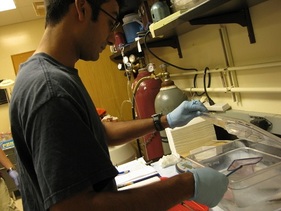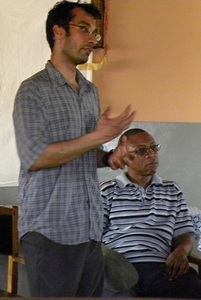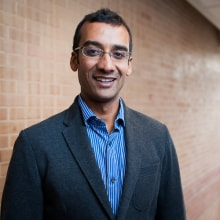|
Niladri (Nil) Basu
Canada Research Chair (CRC) in Environmental Health Sciences Full Professor, Faculty of Agricultural and Environmental Sciences McGill University [email protected] 514-398-8642 |
Dr. Nil Basu holds a Canada Research Chair (CRC) in Environmental Health Sciences and is a Full Professor in the Faculty of Agricultural and Environmental Sciences at McGill University's Macdonald campus. He is jointly appointed in the Department of Natural Resource Sciences and in the School of Human Nutrition. He is also an Associate Member of McGill's Department of Epidemiology, Biostatistics and Occupational Health, as well as the McGill School of Environment. He is a member of CINE (Center for Indigenous Peoples' Nutrition and Environment), and it is in the CINE Building in which his office and main laboratory are based. Prior to joining McGill in 2013, he was an Assistant Professor of Environmental Health Sciences at the University of Michigan School of Public Health in Ann Arbor (2007-2013). He holds an Adjunct Professorship at the University of Michigan School of Public Health.

Prof. Basu obtained his Bachelors of Science (BSc) degree from Queen’s University (Kingston, Ontario) where he specialized in Environmental Sciences and Life Sciences (advisor: Dr. Peter Hodson). A Masters of Science (MSc) degree was then obtained from the University of British Columbia (Vancouver, BC) where he studied the relationships between chemical pollution and physiological stress responses (advisor: Dr. George Iwama). He received a NSERC Fellowship to conduct his doctoral (PhD) research at McGill University’s Center for Indigenous Peoples’ Nutrition and Environment (CINE). At CINE, his research focused on the impacts of mercury and other toxic environmental chemicals on ecosystem health and aboriginal health (advisor: Dr. Laurie Chan). He next spent two years as a NSERC Postdoctoral Scholar with Environment Canada and the Canadian Wildlife Service in Ottawa (advisor: Dr. Tony Scheuhammer), as well as the Center for Advanced Research in Environmental Genomics (CAREG) at the University of Ottawa (advisor: Dr. Vance Trudeau).

The goal of Prof. Basu's research is to take an ecosystem approach to community, occupational, and environmental health whereby evidence is collected, scrutinized, and compared from both humans and ecological organisms (see other sections of this website, notably Mission, Projects, and Publications). The research has been supported by more than 45 grants totalling over $42 million, largely coming from Federal sources (e.g., NSERC, US National Institutes of Health, Environment Canada, US Environmental Protection Agency, Genome Canada). The research has been covered by a number of news outlets, including NPR, Associated Press, Discovery Channel, Bloomberg News, and the Guardian, and documentaries have been produced by UK Channel 4 and France's Extinction TV. The group has published over 250 peer-reviewed publications and delivered over 500 scientific presentations (including >80 invited ones). Dr. Basu has provided mentorship to over 130 trainees, including 15 visiting scholars, 19 postdoctoral fellows, and 13 PhD students. Dr. Basu has sat on a number of grant review panels (e.g., US EPA STAR program, Deepwater Horizon), organized and chaired numerous scientific sessions at national and international conferences, and serves as an Editor or Editorial Board Member of key journals in the field (Environmental Toxicology and Chemistry, Environment International, Ecotoxicology and Environmental Safety). In recent years Dr. Basu has assumed roles to help build capacity and link academic, government, NGO, and/or industry partners. For example, he currently leads the EcoToxChip project (>120 members from across government, industry, academia), and has helped co-organize meetings in the Great Lakes (170 scientists and policy makers; 300,000 data points; 35 peer-reviewed papers), Aamjiwnaang First Nation (~25+ scientists, community members and leaders), and Ghana/West Africa (35+ experts from government, industry, NGOs, universities, and communities).

